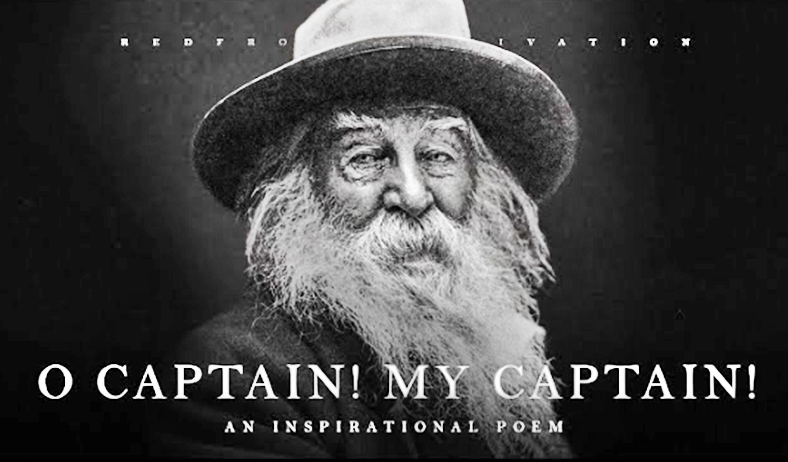O`CAPTAIN MY CAPTAIN!

By ChatGPT4o-Tome-Human Synthesis- 07 Sept. 2024
A conclusion of the famous poem by Walt Whitman 1819 –1892
The fall of the Captain, as portrayed in the poem, transcends a simple narrative of loss or grief. It symbolizes the philosophical paradox of life itself—where triumph and tragedy are intertwined, and every moment of achievement is shadowed by impermanence. The ship’s safe return after a fearful journey mirrors the human pursuit of success, while the Captain’s death on the deck reflects the unavoidable truth that even in victory, mortality reigns supreme.
Philosophically, the Captain represents more than a leader or a father figure; he embodies the guiding principles, hopes, and ideals we follow throughout our lives. His death at the moment of victory suggests that while we spend much of our existence striving toward goals—whether they are personal, professional, or spiritual—the culmination of that pursuit often reveals a deeper truth: that life itself is impermanent, and no achievement can ultimately shield us from the inevitability of death.
This paradox invites reflection on the nature of human existence. The prize we seek, whether it be success, recognition, or fulfillment, is always fleeting. The shore we yearn for symbolizes the material achievements we aim for in life, but as we draw near, the Captain’s fall reminds us that even the greatest of triumphs cannot bring lasting satisfaction or escape from life’s end. The joyous ringing of the bells for the ship’s return contrasts sharply with the mourner’s realization that something essential—the Captain—has been lost. This reflects the philosophical tension between external success and internal fulfillment.
The mournful cry of “O heart! heart! heart!” and the red drops of blood on the deck signify that in every victory, there is a hidden sacrifice. What the Captain's death reveals is that the pursuit of external goals alone cannot fulfill the deeper longing of the human spirit. The fragility of life, which we often overlook in our quest for success, becomes undeniable when confronted with the reality of death.
Philosophically, this moment points to the limits of human ambition. While society may celebrate the “victor ship,” and exult in the return to port, the individual—represented by the speaker—faces a profound existential realization: that life’s greatest achievements may come at a cost that cannot be reclaimed. The silence of the Captain speaks to the emptiness that can accompany even the most celebrated victories. The dead Captain, the once-living guide, symbolizes the ultimate lesson of impermanence, the universal condition that all human beings must grapple with.
At its core, the Captain’s fall suggests that the true journey of life is not one of external conquest or achievement, but of inner transformation. The voyage—the trials and tribulations weathered on the sea—becomes a metaphor for the human condition, where suffering, struggle, and growth are inevitable. The realization that the Captain lies "cold and dead" is not simply a moment of grief, but an awakening to the profound nature of existence. Life, in all its chaos and beauty, does not offer permanent rewards but continual opportunities for reflection, growth, and understanding.
The philosophical conclusion here is that while the external world celebrates the destination—the port, the prize, the victory—true wisdom lies in recognizing the importance of the journey itself. The loss of the Captain represents the understanding that every moment, even in victory, carries with it the shadow of impermanence. This understanding calls us to shift our focus from seeking external rewards to cultivating an inner awareness of life’s transient nature. The mourning of the Captain is, therefore, not just a lament for a lost leader but a recognition of life’s ultimate fragility.
In this, we see a deeper truth: the value of the journey is not in what we achieve, but in how we face the realities of life and death along the way. The Captain’s death teaches that wisdom, compassion, and fulfillment arise not from what we acquire or accomplish, but from how we navigate the storms of life, how we accept the inevitability of loss, and how we find meaning in the process of living. The “fearful trip” may be done, but the philosophical voyage of understanding is eternal.
In this way, the Captain’s fall becomes not an end, but a beginning—an invitation to embrace life’s impermanence, to live fully in the present, and to understand that the ultimate prize is not victory over the world, but peace with ourselves.
